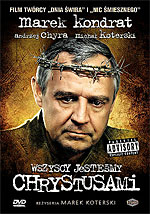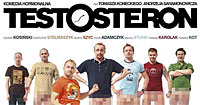A huge workload means I can’t do much more than brief jottings on a handful of Polish films that I’ve seen recently, but here goes:
War of the Worlds: Next Century (Wojna światów – następne stulecie, d. Piotr Szulkin, 1981)
The sly opening dedication to H.G.Wells and Orson Welles works on at least two levels: as an acknowledgement of the men who respectively wrote and adapted the original ‘The War of the Worlds’, and as a warning not to take anything in the film at face value. Sure enough, in addition to constructing a memorably sour Orwellian vision of a near-future Poland after a visit by Martians (it’s unlikely the references to invasion and occupation would have been lost on its original audience), Szulkin also examines how the media are complicit in both its presentation and in behind-the-scenes string-pulling, and his view of the population-lulling effect of “reality television” (which is even called that at one point) is worryingly prescient. Fittingly, the protagonist Iron Idem (Roman Wilhelmi) is a television anchorman who first realises that something might be awry is when he’s given an entirely new script to read mere seconds before he goes on air.
O-Bi, O-Ba: The End of Civilisation (O-Bi, O-Ba. Koniec cywilizacji, d. Piotr Szulkin, 1985)
While the previous film was set in a just about recognisable near future, here civilisation has collapsed completely, with a gaggle of survivors of an unspecified catastrophe waiting for their own Godot in the form of a mysterious Ark that will take them to a far better place. Government apparatchik Soft (Jerzy Stuhr) knows that it’s all a propagandist lie concocted to stave off absolute despair – but is startled to find his normally sane colleagues taking it seriously. Szulkin’s film certainly doesn’t lack ideas, and his realisation of a crumbling civilisation is highly convincing (especially given a clearly limited budget), but this did less for me than the other two: the satirical elements of the others are muted in favour of a setting and narrative that’s a little too familiar to Western eyes.
Ga-ga: Glory to the Heroes (Ga, Ga – Chwała bohaterom, d. Piotr Szulkin, 1986)
The third Szulkin dystopia seems to begin where its predecessors left off, as its unnamed protagonist (Daniel Olbrychski) is blasted from a prison ship onto a supposedly uncharted planet. Instead, he finds a conveniently Polish-speaking world full of people who worship him as a hero and offer him all manner of blandishments, including sexual ones. But he is rightly sceptical: he’s actually being groomed to play the leading role in a hi-tech variant of the crucifixions on Mount Golgotha. This is much closer to blackly comic farce than its predecessors, laced with generous splashings of gore in set-pieces reminiscent of the early work of Sam Raimi and Peter Jackson. Olbrychski plays it admirably straight, while a grotesque Jerzy Stuhr has a whale of a time as a sinister cultural attaché.
(A far more comprehensive English-language study of these three features can be found in Ewa Mazierska’s essay Polish Cinematic Dystopias)
King Ubu (Ubu król, d. Piotr Szulkin, 2003)
I haven’t read Alfred Jarry’s play since my teens, so can’t recall too many specifics, but Szulkin’s adaptation certainly catches its blend of the childishly scatological and the politically pointed. The play was also set in Poland, so it’s entirely fitting that its themes have been grafted onto a present-day Poland in imminent danger of complete collapse as its various institutions struggle to retain their authority in the face of Ubu’s arbitrary cruelty. The caricature is often extremely broad, and performances are borderline demented, but that’s true to Jarry too. This wouldn’t be my first recommendation for someone new to Szulkin, but it’s good to see him back to making features after a break of over a decade.
(All four of the Szulkin films are available on DVD with English subtitles on the SPI International Polska label. Transfers range from acceptable to excellent, but extras – including extensive interviews with Szulkin – are unsubtitled.)
 We’re All Christs (Wszyscy jesteśmy Chrystusami, d. Marek Koterski, 2006)
We’re All Christs (Wszyscy jesteśmy Chrystusami, d. Marek Koterski, 2006)
What’s good: as a study of alcoholism and its disastrous effect on a man’s relationship with his wife and son, this is the most horrifically convincing of its type since Mike Figgis’ Leaving Las Vegas, and is made doubly disturbing by wholly credible performances. What’s bad: the hysterically overwrought and bludgeoningly unsubtle Catholic imagery makes Ken Russell look restrained, and makes otherwise very strong material look faintly ridiculous. (Caveat: the review DVD froze fifteen minutes from the end, so I don’t know if the conclusion justified the earlier excesses).
 Testosterone (Testosteron, d. Andrzej Saramowicz, Tomasz Konecki, 2007)
Testosterone (Testosteron, d. Andrzej Saramowicz, Tomasz Konecki, 2007)
Adapted from a successful stage play in which seven men survey the wreckage of a wedding and try to work out what went wrong, this neatly conceals its theatrical origins via a series of witty flashbacks and nifty conceptual conceits, but is hampered by an excessive two-hour running time, observations about gender roles that devote too much time to stating the blindingly obvious, and at least one of the directors’ abiding obsession with the work of Quentin Tarantino in general and Reservoir Dogs in particular. But strong performances and dialogue just about keep it afloat. (I’ll be reviewing this in more detail in the next Sight & Sound).
[…] Piotr Szulkin Ein polnischer Regisseur ist zu entdecken, der des Genre des gesellschaftskritischen Science Fiction-Films auf seine ganz eigene Weise weiterentwickelt hat. Michael Brookie weist in seinem Kinoblog unter Polish précis u.a. auf 4 Filme von Piotr Szulkin hin, die in Polen auf DVD mit englischen Untertiteln lieferbar sind, darunter “… zwei Klassiker des polnischen Science Fiction-Films, bzw. des „utopischen Films“ wie man das Genre in Osteuropa nannte, um die Terminologie des Klassenfeinds zu vermeiden. Kaum ein anderer polnischer Regisseur hat sich diesem Genre so verpflichtet wie Piotr Szulkin, der mit WOJNA SWIATOW – NASTEPNE STULECIE (The War of the World: Next Century, Polen 1981) und O-BI, O-BA, KONIEC CYWILIZACJI (O-bi, O-ba, Das Ende der Zivilisation, Polen 1984) neue Maßstäbe setzte.” (Arsenal) […]